2024 Events
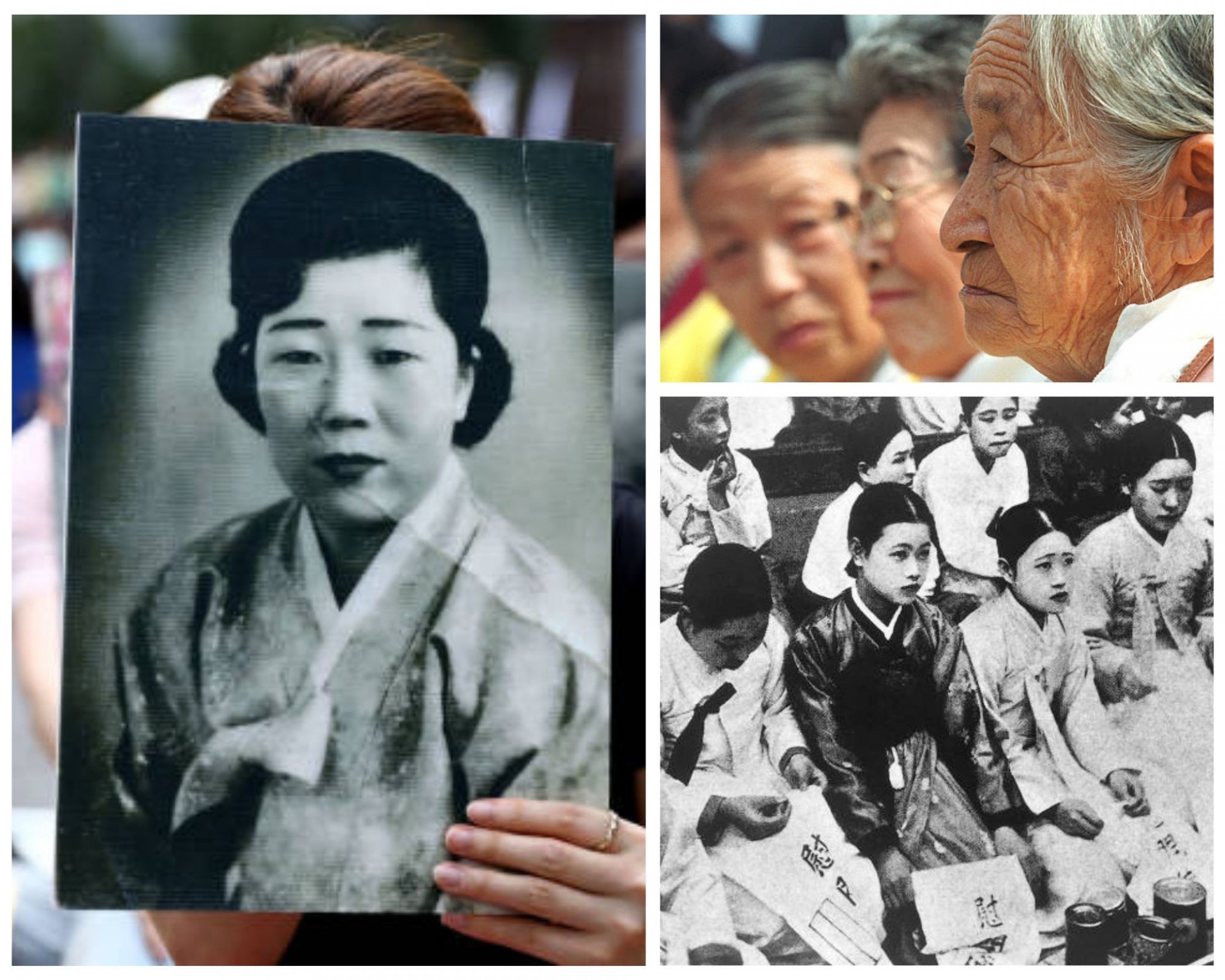
The Center was proud to co-host an event entitled "The Legacy of WWII Asian-Pacific 'Comfort Women,' " which explored recent developments, lessons learned and how we should address rape and sexual violence during conflicts. Organized by the Columbia Center for International Law.
The event can be viewed here.
2023 Events

Tackling North Korea’s Nuclear Program and Human Rights Abuses
April 18, 2023
Dealing with the nuclear threat from North Korea and its human rights abuses is a complex issue that has been a persistent challenge for the United States and its allies. Despite numerous rounds of sanctions and diplomatic efforts, the North Korean nuclear threat and human rights situation remain unchanged. As North Korea has grown closer to China and Russia following the outbreak of the Ukraine War, engagement with the international community has all but ceased. What combination of diplomacy, sanctions, humanitarian aid, and support for human rights activists might be effective in breaking the impasse?
Ambassador Joonkook Hwang, Permanent Representative of the ROK to the UN, examined the current state of the North Korean nuclear program and human rights abuses, and proposed approaches to addressing these challenges.
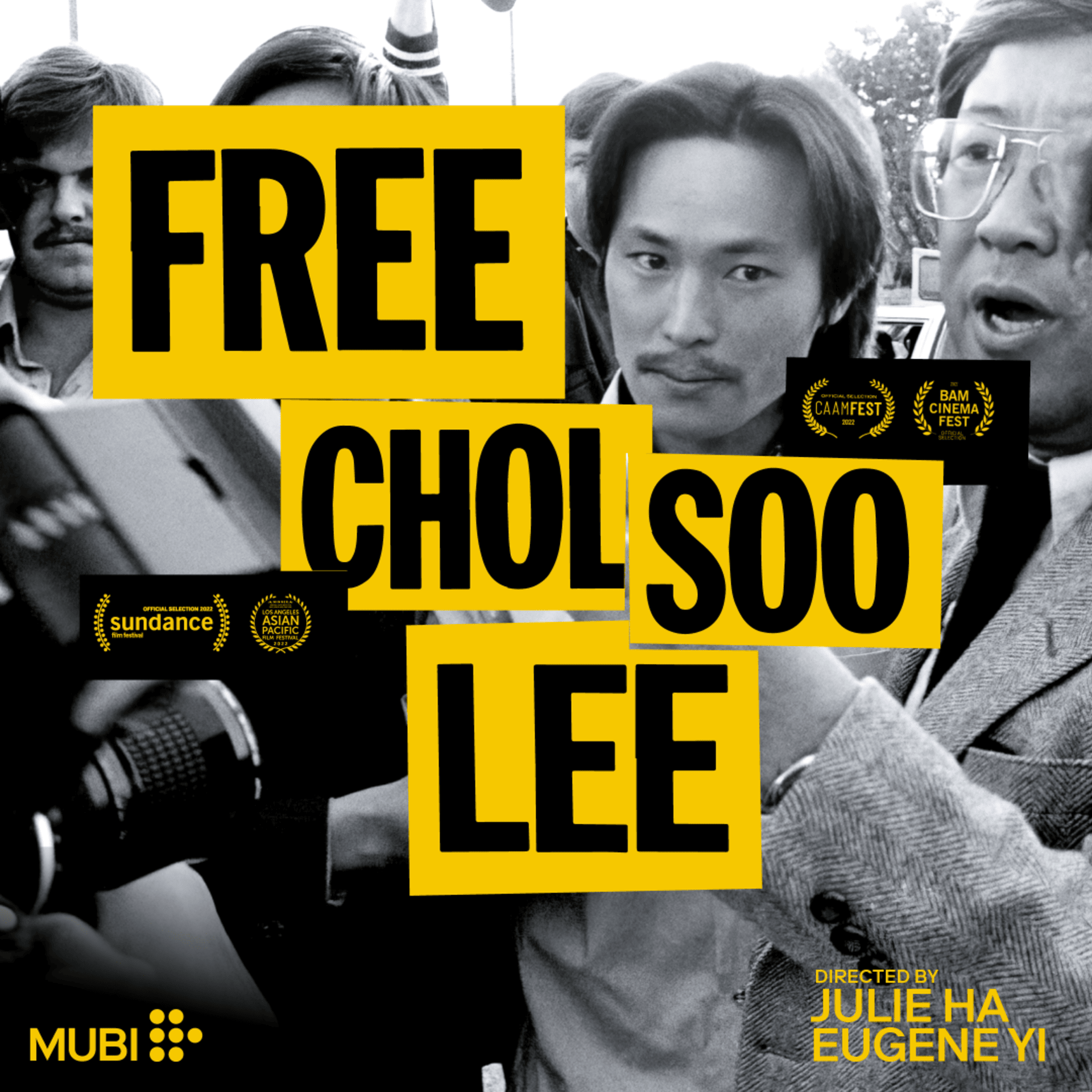
Free Sol Choo Lee: Film Screening and Directors Q&A
April 10, 2023
In 1970s San Francisco, 20-year-old Korean immigrant Chol Soo Lee is racially profiled and convicted of a Chinatown gang murder. Sentenced to life, he spends years fighting to survive until investigative journalist K.W. Lee takes a special interest in his case, igniting an unprecedented push for social action that would unite Asian Americans and inspire a new generation of activists.
2022 Events
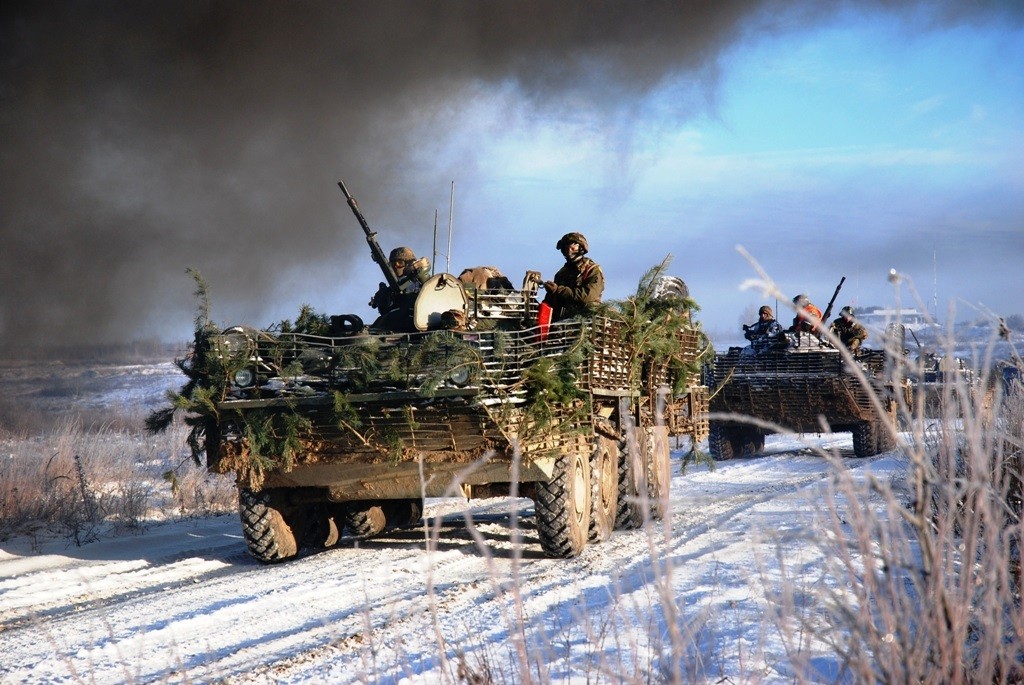
One Korea? Prospects for Inter-Korean Relations and Reconciliation in the Changing International Order
September 21, 2022
On September 8, North Korea passed new legislation governing its use of nuclear weapons. The new legislation enshrines the right to the preemptive use of nuclear weapons, a marked departure from an earlier law which stated that nuclear weapons were for defense and deterrence only. The language of the new legislation is vague enough to give Pyongyang wide latitude in justifying their use, and overnight changed the dynamics on the Korean Peninsula. Since the breakdown of diplomatic engagement with North Korea following historic meetings between Moon Jae-in, Donald Trump and Kim Jong Un in 2018, tensions have increased sharply. After the start of the war in Ukraine, South Korea moved closer to the US and Japan, while North Korea moved closer to Russia and China. With the election of Yoon Seok-youl and President Joe Biden’s recent visit to Seoul and Tokyo, South Korea’s alignment with the West has solidified, even as far as warming relations with Japan. On the other side, the friendship between China and Russia knows “no limits” and North Korea is reportedly supplying weapons to Russia to aid in its war against Ukraine. From a legal perspective, a peace process for the Korean Peninsula requires the cooperation of all these nations. Given the current climate and the ways the international order has changed since the end of the Cold War, is it possible to build the trust and confidence needed for improved inter-Korean relations, much less reconciliation? Is there a path forward that could involve all the stakeholders? Is there a path that South Korea and North Korea could pursue independently?
CKLS Director Jeong-Ho Roh, Victor Cha (CSIS), Alexis Dudden (UCONN) and Terence Roehrig (US Naval War College) explored whether the war in Ukraine and the changing international order has fundamentally and permanently changed the long term chances for greater cooperation between South Korea and North Korea and the prospects for peace on the Korean Peninsula.
Supported by the Korea Foundation.
2021 Events
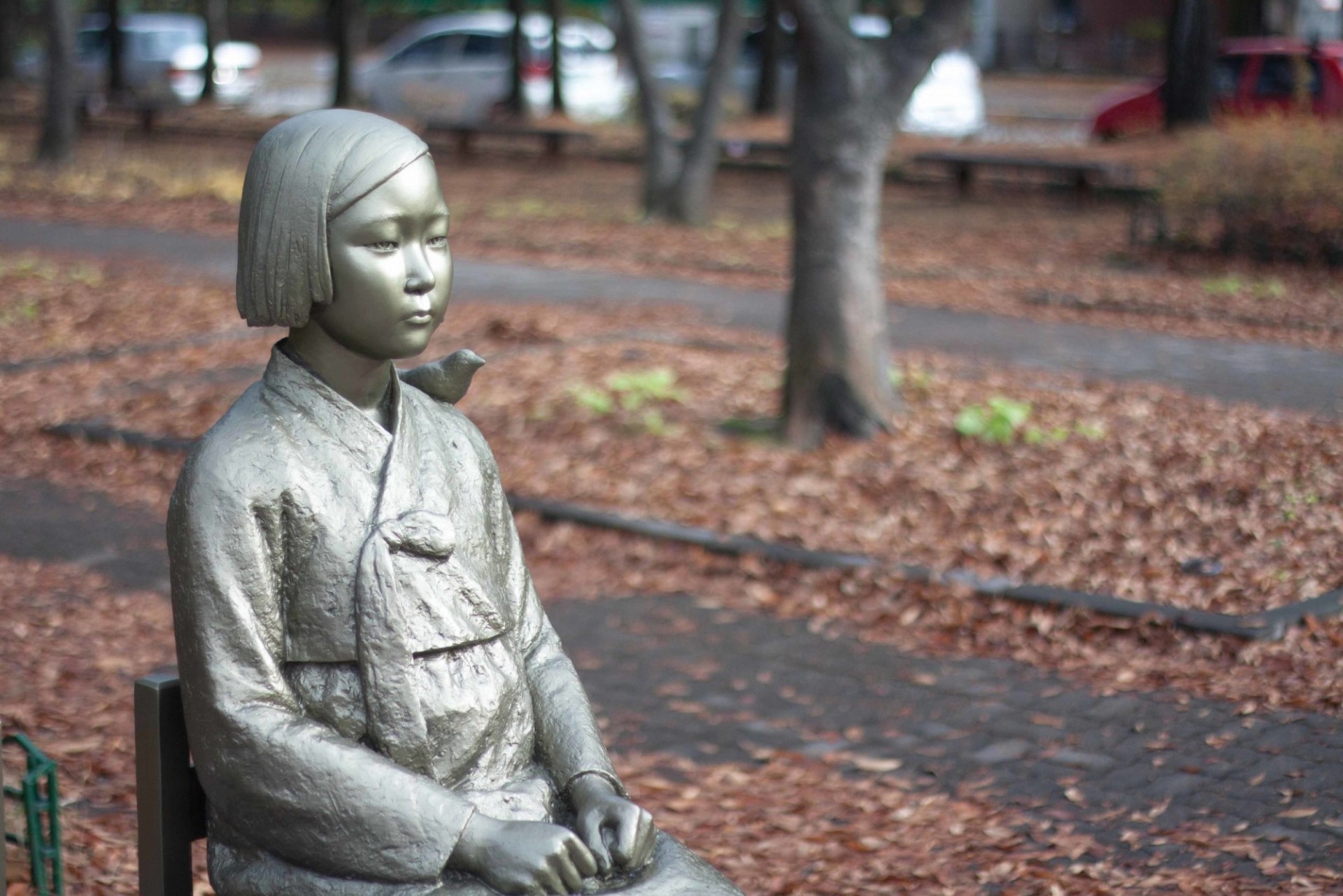
Wartime Legacies: Korean, Japanese and U.S. Perspectives on Recent Court Cases on the “Comfort Women”
February 21, 2022
In January 2021, a South Korean court ordered the Japanese government to pay damages to twelve Korean women forced into sexual servitude in military brothels during World War II. Though largely symbolic since the Japanese government refused to appear in court and has rejected the judgement on the grounds that Korea has no jurisdiction over Japan, it is certain to further inflame relations between the United States’ two most important allies in East Asia. What are the legal issues behind this case? What arguments does each side bring to bear and what is their merit? Given the threats posed by North Korea and China, and American reliance on their allies in the region, how does this ruling complicate the Biden administration’s plans for trilateral cooperation?
The Center for Korean Legal Studies hosted Professor Atsuko Kanehara (President, Japanese Society of International Law, Sophia University), Professor Terence Roehrig (U.S. Naval War College), and Center Director Jeong-Ho Roh for a discussion of the legal aspects of the “Comfort Women," and a look into what role the U.S. might play in helping to finally resolve these complex issues.
Watch on YouTube.
2020 Events
Online Events
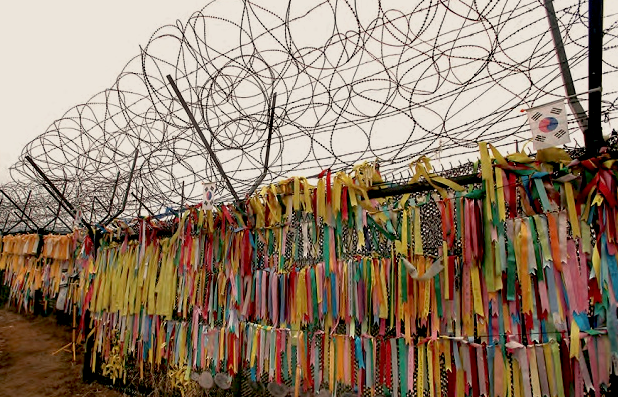
New Paths or Same Direction? The Prospect for Human Rights and Accountability in North Korea
December 16, 2020
With an incoming administration in Washington and new representatives to the UN, the nascent “relationship” between North Korea and the US is likely to undergo a change. Recent discourse has been focused on what this means for the future of denuclearization, yet is there reason to believe that the incoming administration might refocus attention on human rights? What can we expect as to the role of human rights in domestic and international policies, including sanctions and accountability, on North Korea? In conjunction with Universal Human Rights Month, the Center for Korean Legal Studies at Columbia Law School hosted a panel of distinguished experts who addressed both the current status, and future of, human rights in North Korea: Sandra Fahy, Associate Professor of Anthropology in the Faculty of Liberal Arts and the Graduate Program in Global Studies at Sophia University in Tokyo; Stephan Haggard, Professor of Korea-Pacific Studies at the School of Global Policy and Strategy at the University of California, San Diego; David Hawk, former Executive Director of Amnesty International, USA; and Jeong-Ho Roh, Director, Center for Korean Legal Studies.
Watch on YouTube.
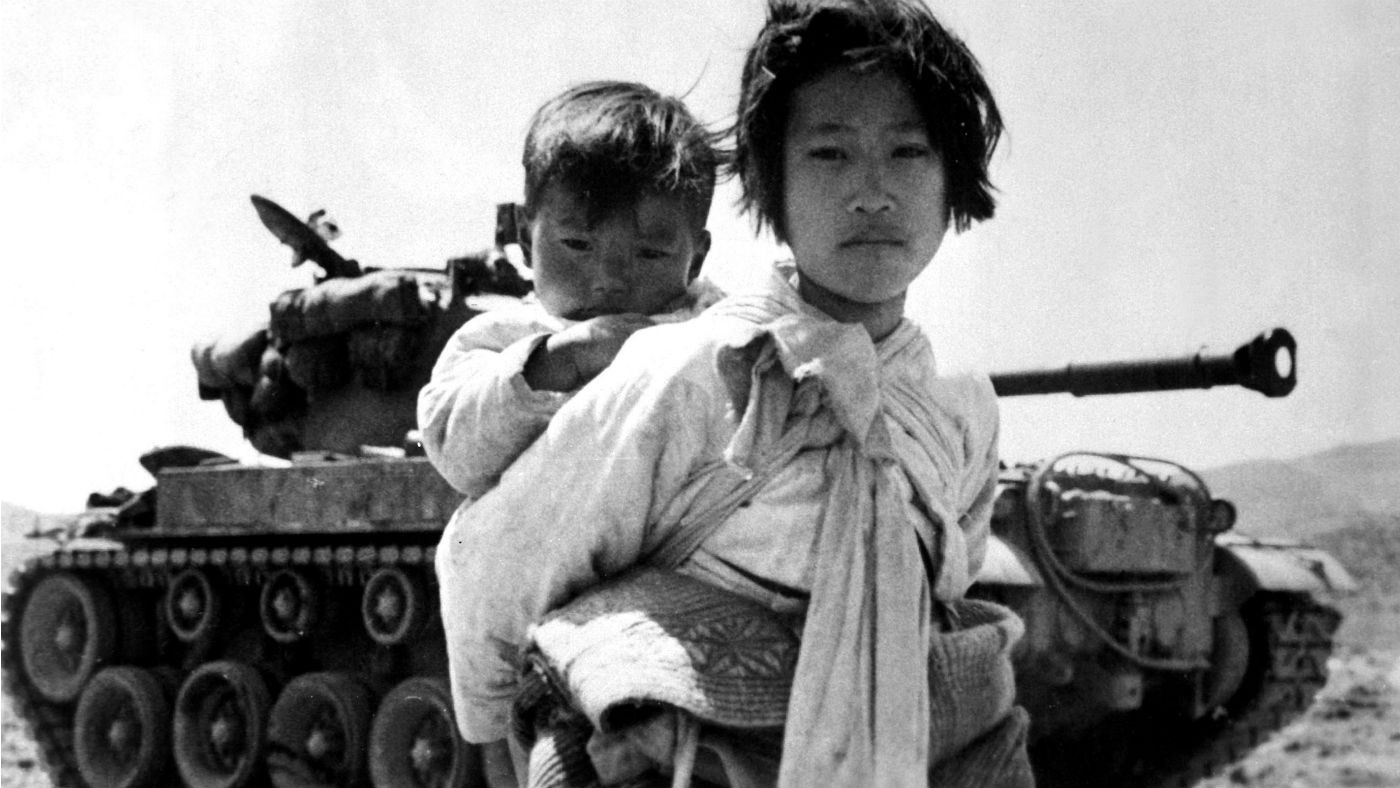
The Korean War at 70: Legacies of the "Forgotten War"
September 24, 2020
This year marks the 70th anniversary of the start of one of the longest ongoing conflicts in the world. Although often called the "Forgotten War” in the United States, the absence of a peace treaty has ensured that the Korean War continues to persist. From divided families, to border tensions, to nuclear escalation, the Korean War’s legacy is far from forgotten as it continues to inform the relations and policy frameworks in Northeast Asia. What cannot be forgotten is how the decisions made both during and after the conflict have contributed to the tensions between South Korea, North Korea, the United States, China, and Japan that continue to the present day. During the Korean War, what decisions were made that persist with us today? Who made the calls and what were the expected outcomes? In the absence of a peace treaty, how has the War continued to underscore tensions between South Korea, Japan and North Korea? Alexis Dudden, University of Connecticut, Terence Roehrig, U.S. Naval War College, and Jeong-Ho Roh, Center for Korean Legal Studies at Columbia Law School discussed how the “Forgotten War,” far from having faded from relevance, is still very much present in East Asia.
Watch on YouTube

East Asia’s Response to COVID-19: Legal Approaches of China, Japan, and South Korea
April 24, 2020
Watch on YouTube
Closely bound by travel and trade, with multiple high density urban centers, the governments of China, South Korea and Japan have each had to contend with COVID-19’s rapid spread. Yet each has taken a different approach to combating the virus and managing it at the national level. What accounts for both the different levels of preparedness and the different approaches in East Asia? What legal measures have been taken by each country? The Directors of the Centers for Chinese, Japanese, and Korean Legal Studies, Ben Liebman, Nobuhisa Ishizuka, and Jeong-Ho Roh at Columbia Law School discussed the comparative approaches, lessons, and the potential for trilateral cooperation.

The Korean War at 70
April 23, 2020
Watch on YouTube
This year marks the 70th anniversary of the start of the Korean War, but the conflict has not ended and the Korean Peninsula remains divided today. Why has this conflict persisted for generations, and what futures are legally feasible? Dr. Stephen Noerper, Columbia University-SIPA, and Jeong-Ho Roh, Center for Korean Legal Studies, Columbia Law School, reflected on the history and future of the Korean War.
Part 1 explored regional relations and the legal discussions underlying the alliance between the U.S. and South Korea, peace, and confidence building in light of nuclear diplomacy. Part 2 addressed the characterization of this conflict as the “Forgotten War”. The short film Last Ship in the Harbor was screened as Admiral J. Robert Lunney recounted the history of the U.S. and Korea through the courageous humanitarian evacuation of North Korean refugees on the SS Meredith Victory.

Implications of COVID-19 for North Korea
April 16, 2020
Watch on YouTube
COVID-19 caught the world off guard, with many nations experiencing devastating outbreaks. Yet North Korea continues to insist it remains “virus free” and has resumed missile testing. How can we understand the regime’s insistence that there are no cases in North Korea? How is the virus nonetheless affecting the discussion of human rights and sanctions for the North Korean people? Jeong-Ho Roh, Director of the Center for Korean Legal Studies at Columbia Law School, Dr. Stephen Noerper, Columbia University-SIPA, and Keith Luse, Executive Director of the National Committee on North Korea discussed the implications of the pandemic on the Korean Peninsula and for U.S.-North Korea relations.
Virtual Brown Bag Series
The Center for Korean Legal Studies’ Virtual Brown Bag Series is a space and community for Columbia Law School’s visiting scholars during the campus’ closure, and from a comfortable social distance, to continue to support their research. It is a space to provide current scholars with an opportunity to share their research alongside other members of the visiting scholar community at Columbia Law School. The Series consists of small informal sessions conducted virtually to provide scholars with a chance to discuss their ongoing research in a relaxed environment, exchange ideas with others, keep in contact, and to gain feedback from colleagues.
Speaking for the Animals: The Legal Debates for Farm Animal Welfare in the U.S.
April 9, 2020
With today’s demand for mass food production, what is “farm animal welfare” in the United States? How has both consumer awareness and new farming practices pressured protective regulation of farm animals? Join us on Thursday, April 9th, as Judge Jaeyoon Song of the Incheon District Court discusses the research he has been carrying out as a Visiting Scholar at the Center for Korean Legal Studies. He will speak about the legal debates concerning the welfare of farmed animals in the United States amidst the legal tensions between Federal and State-level laws and court rulings.
Lectures
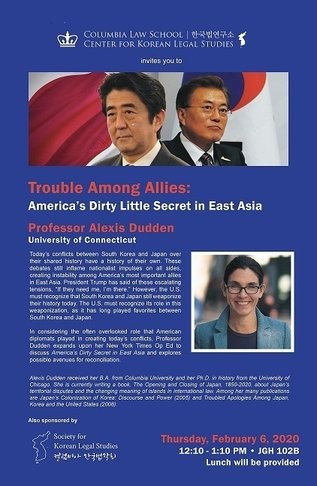
Trouble Among Allies:
America’s Dirty Secret in East Asia
Professor Alexis Dudden, University of Connecticut
February 6, 2020
Today’s conflicts between South Korea and Japan over their shared history have a history of their own. These debates still inflame nationalist impulses on all sides, creating instability among America’s most important allies in East Asia. President Trump has said of these escalating tensions, “If they need me, I’m there.” However, the U.S. must recognize that South Korea and Japan still weaponize their history today. Importantly, the U.S. must recognize its role in this weaponization, as it has long played favorites between South Korea and Japan. In considering the often overlooked role that American diplomats played in creating today’s conflicts, Professor Dudden expanded upon her New York Times Op Ed to discuss America’s Dirty Secret in East Asia and explores possible avenues for reconciliation.
2019 Events
Lectures
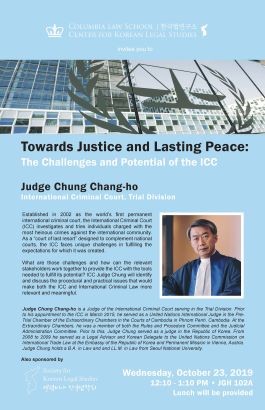
Towards Justice and Lasting Peace: The Challenges and Potential of the ICC
Judge Chung Chang-ho
International Criminal Court, Trial Division
October 23, 2019
Established in 2002 as the world's first permanent international criminal court, the International Criminal Court (ICC) investigates and tries individuals charged with the most heinous crimes against the international community. As a “court of last resort” designed to complement national courts, the ICC faces unique challenges in fulfilling the expectations for which it was created. What are those challenges and how can the relevant stakeholders provide the ICC with the tools needed to fulfill its potential? ICC Judge Chung's presentation identified and discussed the procedural and practical issues that could make both the ICC and International Criminal Law more relevant and meaningful.
Conferences
Columbia-KIOST Joint Project on International Dispute Resolution
Delimitation and Dispute Resolution of the Continental Shelf in the East China Sea
October 18, 2019
Together with the Korea Institute for Ocean Science and Technology (KIOST) the Center held an all-day conference to address the joint development zones of the 1974 “Agreement between the Republic of Korea and Japan Concerning Joint Development of the Southern Part of the Continental Shelf Adjacent the Two Countries" ahead of the Agreement’s forthcoming renewal in 2027. Specific issues examined included the relationship of the Agreement with UNCLOS, continental shelf delimitation, joint development, and dispute resolution.
Conversations
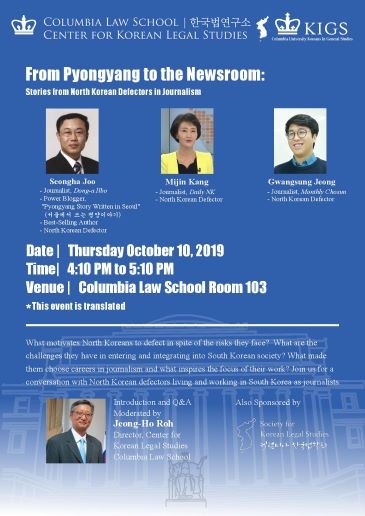
From Pyongyang to the Newsroom: Stories from North Korean Defectors in Journalism
October 10, 2019
What motivates North Koreans to defect in spite of the risks they face? What are the challenges they have in entering and integrating into South Korean society? Join us for a conversation with North Korean defectors living and working in South Korea as journalists. What made them choose careers in journalism and what inspires the focus of their work? Featuring Songha Joo, journalist at Dong-a Ilbo, Author and blogger; Mijin Kang, journalist at the Daily NK; and Gwangsung Jeong, journalist at the Monthly Chosun.
2018 Events
Conversations
Human Rights in North Korea: A Conversation with Defectors
October 31, 2018
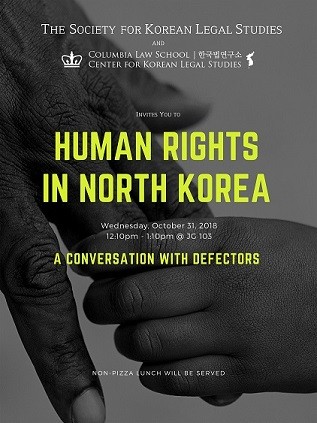
Sponsored by the Society for Korean Legal Studies with support from the Center for Korean Legal Studies, this event featured a conversation on human rights with defectors from North Korea.
Conferences
Columbia-KIOST Joint Project on International Dispute Resolution
The Northern Limit Line: Balancing Inter-Korean Interests in the West and East Seas
October 12, 2018
Together with the Korea Institute for Ocean Science and Technology (KIOST) the Center held an all-day conference to discuss the legal nature of the Northern Limit Line (NLL) and possible legal avenues for a peaceful settlement of the NLL and West Sea coastline issues. View photos.
2018 K-Law Forum
The Korean Peace Process: Law, Diplomacy and Geopolitics
August 28, 2018
Hosted by the Center for Korean Legal Studies and the Korea Legislation Research Institute the forum aimed at advancing the discourse on the Korean peace process and its legal implications, particularly for inter-Korean relations, denuclearization and the Korean War. Based on the Panmunjeom Peace Declaration of April 2018, the topics addressed included legal implications for Korean reunification, the binding force of inter-Korean agreements, the legal framework of inter-Korean exchanges, sanctions-based limits on inter-Korean projects, the nonproliferation rights and responsibilities of the ROK, the settlement of the Northern Limit Line dispute and the effects of inter-Korean normalization on the Armistice.
View the forum agenda. View photos.
Lectures
Kim Jong Un's Strategy for Survival: Prospects for Peace and the Denuclearization of the Korean Peninsula
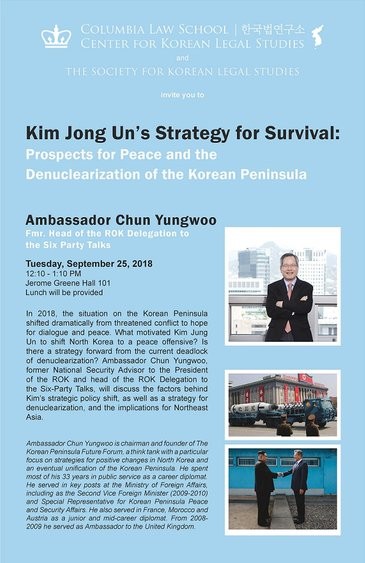
Ambassador Chun Youngwoo
Former ROK Ambassador/Deputy Permanent Representative to the UN and Head of the ROK Delegation to the Six-Party Talks
September 25, 2018
In 2018, the situation on the Korean Peninsula shifted dramatically from threatened conflict to hope for dialogue and peace. What motivated Kim Jong Un to shift North Korea to a peace offensive? Is there a strategy forward from the current deadlock of denuclearization? Ambassador Chun Yungwoo discussed the factors behind Kim's strategic policy shift, as well as a strategy for denuclearization, and the implications for Northeast Asia. View photos.
Rooting Out Corruption: The Korean Investigation System and the Role of Prosecutors
Soonam Kim
Former Prosecutor General of the Republic of Korea
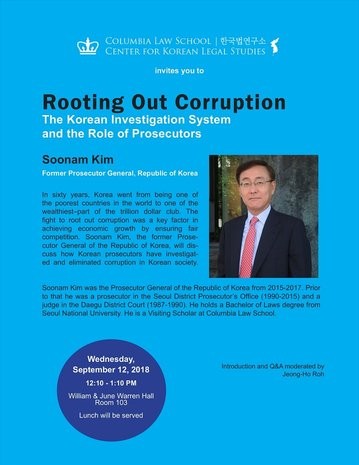
September 12, 2018
In sixty years, Korea went from being one of the poorest countries in the world to one of the wealthiest--part of the trillion dollar club. The fight to root out corruption is a key factor in achieving economic growth by ensuring fair competition. Soonam Kim discussed how Korean prosecutors have investigated and eliminated corruption in Korean society. View photos.
2017 Events
Conferences
Precarious Equilibrium: East Asian Power Dynamics and the Question of Peace in Korea
October 20, 2017
Together with the Korea Institute for National Unification, the Center held an all-day conference exploring the Korean Question from a balance of power perspective. Participants included Bradley Babson, Bowdoin College; Kuyoun Chung, KINU; John Delury, Yonsei University; Alexis Dudden, University of Connecticut; Henri Féron '16, Center for Korean Legal Studies at Columbia Law School; Kyu-Chang Lee, KINU; Terence Roehrig, U.S. Naval War College; Jeong-Ho Roh '88, Center for Korean Legal Studies at Columbia Law School; and Chang-Seok Yang, Ignis Community.
Columbia-KIOST Joint Project on International Dispute Resolution
October 13, 2017
Together with the Korea Institute for Ocean Science and Technology (KIOST), the Center held an all-day conference on international dispute resolution with a focus on issues related to optional exceptions to compulsory jurisdiction under UNCLOS and the implications of the Philippines v. China merits award.
Lectures
Japan at the Crossroads: The Constitutional Debate and the Korea Factor
Professor Alexis Dudden
University of Connecticut
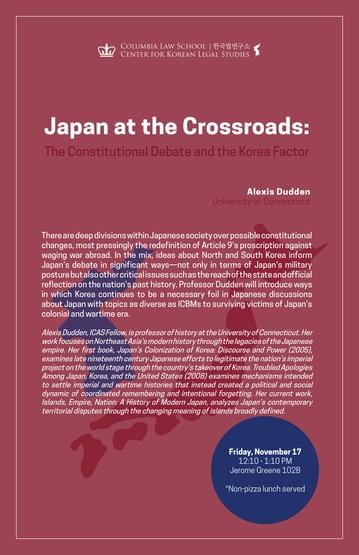
November 10, 2017
There are deep divisions within Japanese society over possible constitutional changes, most pressingly the redefinition of Article 9’s proscription against waging war abroad. In the mix, ideas about North and South Korea inform Japan’s debate in significant ways—not only in terms of Japan's military posture but also other critical issues such as the reach of the state and official reflection on the nation’s past history. Professor Dudden spoke about the ways in which Korea continues to be a necessary foil in Japanese discussions about Japan with topics as diverse as ICBMs to surviving victims of Japan’s colonial and wartime era.
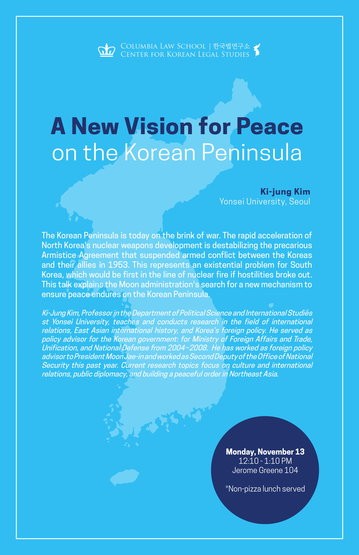
A New Vision for Peace on the Korean Peninsula
Professor Ki-Jung Kim
Yonsei University
November 13, 2017
The Korean Peninsula is today on the brink of war. The rapid acceleration of North Korea's nuclear weapons development is destabilizing the precarious Armistice Agreement that suspended armed conflict between the Koreas and their allies in 1953. This represents an existential problem for South Korea, which would be first in the line of nuclear fire if hostilities broke out. Professor Kim explained the Moon administration's search for a new mechanism to ensure peace endures on the Korean Peninsula.
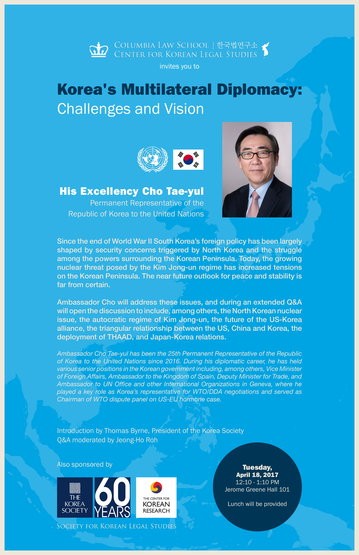
Korea's Multilateral Diplomacy: Challenges and Vision
His Excellency Cho Tae-yul
Permanent Representative of the ROK to the United Nations
April 18, 2017
Since the end of World War II, South Korea’s foreign policy has been largely shaped by security concerns triggered by North Korea and the interface among the powers surrounding the Korean Peninsula. Today, the growing nuclear threat posed by the Kim Jong-un regime has increased tensions on the Korean Peninsula. The near future outlook for peace and stability is far from certain. Ambassador Cho addressed these issues, and during an extended Q&A, opened the discussion to include, among others, the North Korean nuclear issue, the autocratic regime of Kim Jong-un, the future of the US-Korea alliance, the triangular relationship between the US, China and Korea, the deployment of THAAD, and Japan-Korea relations. View photos.
2016 Events
Conferences
Columbia-KIOST Joint Project on International Dispute Resolution
September 8, 2016
Together with the Korea Institute for Ocean Science and Technology (KIOST), the Center held an all-day conference on procedures related to territorial dispute resolution under the United Nations Convention on the Law of the Sea (UNCLOS).
See photos of the 2016 conference.
Pathways to a Peaceful Korean Peninsula: Denuclearization, Reconciliation and Cooperation
September 21, 2016
Together with the Korea Institute for National Unification (KINU), the Center held an all-day conference exploring the complex issues surrounding South Korea-North Korea unification, with an emphasis on denuclearization, cooperation and reconciliation. Topics discussed included the legal framwork of diplomacy under the San Francisco system, nuclear diplomacy, the sanctions regime against North Korea, conditions for rapprochement, state succession, and models for unification. Panelists included Kyung-ok Do, KINU; Henri Feron, Columbia Law School; Ruediger Frank, University of Vienna; Alexandre Mansourov, U.S.-Korea Institute at SAIS; Ye Joon Rim, KINU; Jeong-Ho Roh, Columbia Law School; Leon Sigal, Social Science Research Council; Hazel Smith, UCLAN; Joel S. Wit, U.S.-Korea Institute at SAIS; and Chang-Seok Yang, Ignis Community.
See photos from the conference.
The book published following the conference, Pathways to a Peaceful Korean Peninsula: Denuclearlization, Reconciliation and Cooperation is available. Please send inquires to Joan Wargo, [email protected].
Lectures
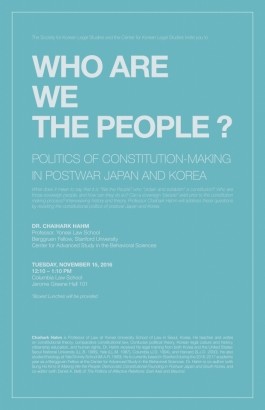
Who are 'We the People'?: Politics of Constitution-making in Postwar Japan and Korea
Professor Chaihark Hahm
Yonsei University
November 15, 2016
What does it mean to say that it is "We the People" who "ordain and establish" a constitution? Who are those sovereign people, and how can they be so? Can a sovereign "people" exist prior to the constitution making process? Interweaving history and theory, Professor Chaihark Hahm discussed these questions by revisiting the constitutional politics of postwar Japan and Korea. View photos.
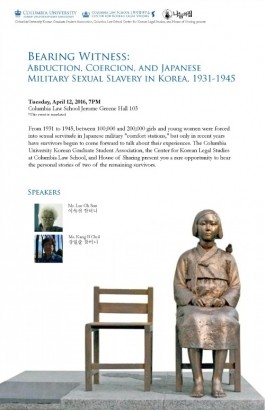
Bearing Witness: Abduction, Coercion, and Japanese Military Sexual Slavery in Korea, 1931-1945
April 12, 2016
From 1931 to 1945, between 100,000 and 200,000 girls and young women were forced into sexual servitude in Japanese military "comfort stations," but only in recent years have survivors begun to come forward to talk about their experiences. The Center for Korean Legal Studies, the Korean Graduate Student Association, and House of Sharing presented a rare opportunity to hear the personal stories of Lee Ok-Sun and Kang Il-Chul, two of the remaining survivors. See photos from the event.
